Achieving sales targets is never easy. With longer sales cycles, growing competition, and constantly changing market trends, keeping prospects interested and delivering steady revenue growth is quite challenging. But heres the good news Sales acceleration software can make...
Achieving sales targets is never easy.
With longer sales cycles, growing competition, and constantly changing market trends, keeping prospects interested and delivering steady revenue growth is quite challenging.
But heres the good news Sales acceleration software can make a big difference. These advanced platforms use data and automation to optimize your sales process at every stage.
As a result, you can book more meetings, follow up automatically, and accelerate the path from lead to sale.
In this post, weve researched and compiled a list of the 15 best sales acceleration software you can consider using to close more deals.
Sales Acceleration Software Table of Contents
What Is Sales Acceleration?What Is Sales Acceleration Software?15 Best Sales Acceleration Software to Use in 2024Ready to Accelerate Your Sales Process?FAQsWhat Is Sales Acceleration?
Before diving into the sales acceleration software list, lets first understand what is sales acceleration.
Sales acceleration refers to the strategies, processes, and technologies used by sales teams to shorten sales cycles and speed up deal velocity. The goal is to take your prospects from initial outreach to a successful closing more quickly.
Sales acceleration software can help you shorten the sales process with automation, analytics, and AI capabilities.
What Is Sales Acceleration Software?
Sales acceleration software is a technology solution designed with a specific purpose to help overcome obstacles, expedite sales workflows, and reduce the time it takes to close deals.
These solutions aim to eliminate friction in the sales process in order to accelerate revenue growth.
With these tools, you can improve different parts of your sales funnel including:
Increasing responses to your cold outreachStreamlining sales follow-upsUncovering helpful insightsIdentifying patterns and optimizing strategiesBoosting your overall sales velocityThat said, lets explore the best sales acceleration tools and understand how they can help to achieve your sales numbers.
15 Best Sales Acceleration Software to Use in 2024
When it comes to sales acceleration, there are plenty of tools out there, each claiming to be the best solution.
But in reality, only a handful of solutions actually move the needle when it comes to accelerating sales velocity.
Based on extensive research and real-world testing, here are the best sales acceleration software that can help you achieve your sales goals more efficiently.
SaleshandySalesflareSalesLoftOutreachMarketo EngageSalesforce Sales CloudHubspot Sales HubUniqodePipedriveEngageBayLeadSquaredZendesk SellGrooveZoho CRMFreshworks CRM1. Saleshandy
If youre trying to increase your sales and revenue through outbound strategies, nothing can beat the ROI of cold email outreach.
In fact, research has shown that $1 spent on email can bring $36 ROI.
If you want to boost your sales through cold email outreach, Saleshandy is a great pick. This cold email software makes it easy to execute hyper-targeted, personalized outreach at scale.
Using Saleshandy, you can create hyper-targeted and automated email campaigns that convert more prospects in less time.

If youre looking to accelerate the number of deals won, adopting an email outreach tool can make the entire cold email outreach seamless.
Key Features of Saleshandy:
Email Personalization Saleshandy comes with Merge tags and Spintax features that allow you to insert unique prospect information such as first name, company name, pain point, and so on. This helps you personalize the content in your email for each prospect youre targeting for sales. Auto Follow-Up Using the Auto Follow-Up feature, you can set up and send automated follow-up emails to prospects who havent yet responded to your previous email and increase the response rate of your outbound sales campaign. A-Z Testing The A-Z Testing is an evolved feature of A/B testing. Instead of experimenting with two different versions, this feature lets you create and test 26 different versions of an element of your email content. This includes subject lines, a pre-header text, and any part of your email body content. Advanced Team Management The Advanced Team Management feature lets you create different types of roles in Saleshandy such as owner, team manager, team member, and admin. so that you can effortlessly monitor your teams performance, all from one place. CRM Integrations You can easily sync your Saleshandy activities with popular CRMs like Zoho CRM, HubSpot CRM, and Pipedrive for effective customer management. Unified Inbox When youre using multiple email accounts to send outbound sales emails, it can become overwhelming to keep track of and manage prospects responses. The Unified Inbox feature brings your prospects responses from all your email accounts in one central place. Advanced Analytics Reporting The Advanced Analytics & Reporting feature in Saleshandy can help you track important email metrics like email opens, clicks, replies, and unsubscribes so you can see whats working and modify your sales emails accordingly. Sequence Score The Sequence Score feature helps to gauge the overall effectiveness of your email sequence based on the Email Setup, Sequence Setup, and Email Copy. Plus, you can also get tips on how to make your Sequences more effective. Sender Rotation Sender Rotation allows you to connect unlimited email accounts and randomly use them when youre sending automated sales emails. This helps to ensure your emails are not flagged as spam and maintains high email deliverability.Pros and Cons of Saleshandy:
Pros:
Connect unlimited email accounts at no additional cost.The free trial allows you to test-drive key features.Built-in email verification functionality.Email templates library for different use cases.Detailed prospect and campaign analytics.Automates sending follow-up emails.Integrates with popular third-party CRMs.Advanced email deliverability features.Real-time email tracking.AI-powered email writing assistant.Manage all your email communication from one unified inbox.Improve the overall effectiveness of your email campaign with the sequence score.Reach prospects primary inboxes with sender rotation.Cons:
No free plan (7-day free trial available).Saleshandy Pricing:
Outreach Starter
30% Annual Savings
Unlimited Email Accounts Unlimited Email Warm-up Sender Rotation Basic Unified Inbox Basic 2,000 Total Prospects 10,000 Monthly Emails 2,500 Email Verification CreditsOutreach Pro
25% Annual Savings
Everything in Outreach Starter Unlimited Teammates Sender Rotation Pro Unified Inbox Pro 30,000 Total Prospects 125,000 Monthly Emails 10,000 Email Verification CreditsOutreach Scale
25% Annual Savings
Everything in Outreach Pro Sender Rotation Scale 60,000 Total Prospects 250,000 Monthly Emails 25,000 Email Verification CreditsGet more details about Saleshandy pricing from here.
Customer Ratings:
G2 4.7 /5 based on 500+ reviewsCapterra 4.5
/5 based on 500+ reviewsCapterra 4.5 /5 based on 100+ reviews
/5 based on 100+ reviews

2. Salesflare
Salesflare is an all-in-one sales CRM that is specially designed for small and medium businesses. It can help you manage your leads, automate workflows, and track email and call activity in one intuitive platform.
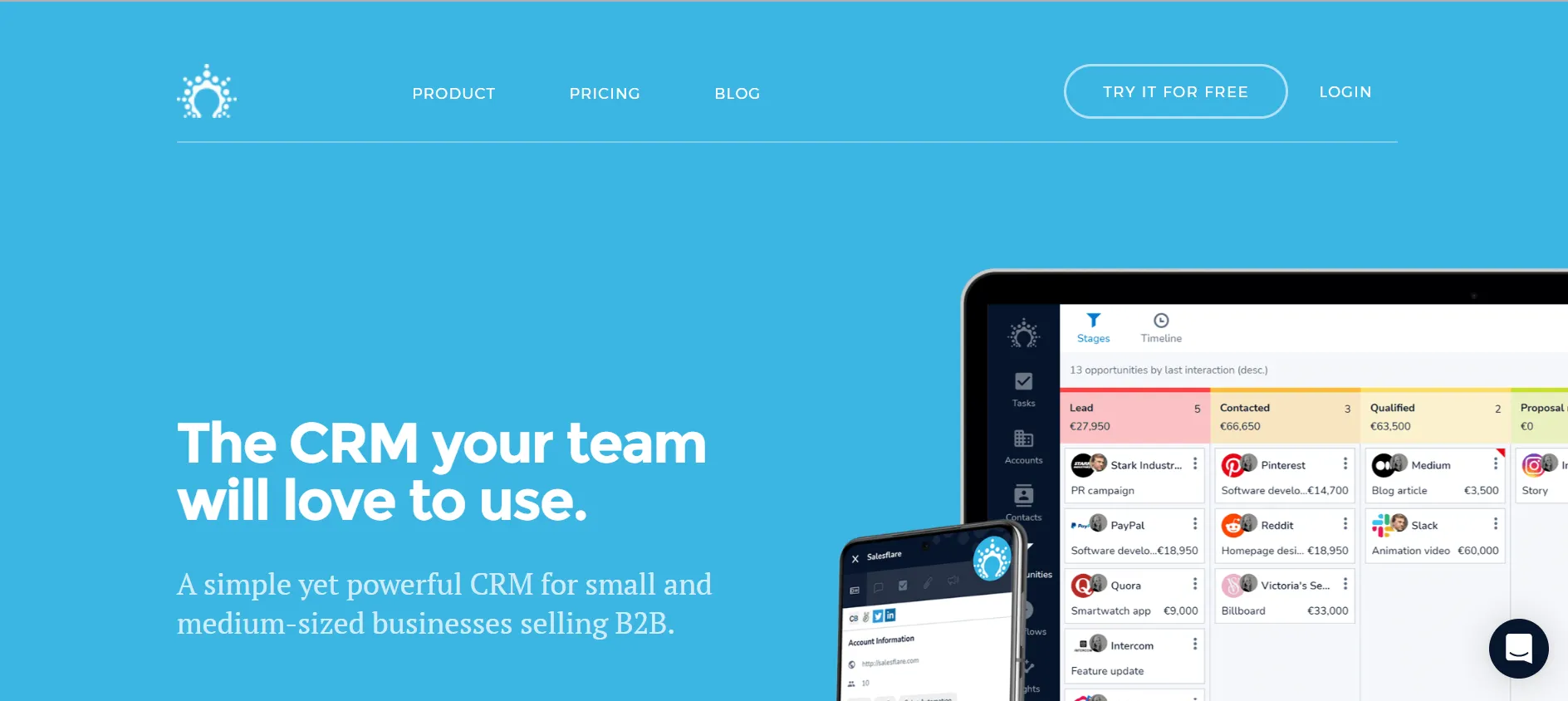
Salesflare stands out for its ease of use and automation features like lead scoring, email sequencing, and workflow triggers. Youll get notifications when prospects open your emails so that you can follow up with them at just the right time.
Salesflare also integrates directly with your inbox. As a result, you can track emails sent outside the software.
Overall, Salesflare has (almost) everything you need to accelerate your sales cycle.
Key Features of Salesflare:
Contact Management You can easily organize and track your contacts, including emails, phone numbers, and social profiles, in one central location. Email Integration & Campaigns With Salesflare, you can seamlessly connect other email accounts, streamline follow-ups, or create custom drip campaigns to nurture leads, and track your email communications. Email Tracking You can see when your emails are opened and clicked, so you know who is engaging with your outreach. Lead Enrichment Salesflare automatically enriches leads by finding email addresses, phone numbers, social profiles, and more to build your contact database. Reporting & Analytics You can generate reports to analyze the effectiveness of campaigns and view sales metrics and pipeline data.Pros and Cons of Salesflare:
Pros:
Comes with an easy-to-use interface.Organize and prioritize deals effectively with the visual sales pipelineOffers task lists and reminders to keep you on top of your to-do items.Offers a variety of integrations with other tools and software to enhance your workflow.Get centralized storage for sales-related documents and files.Cons:
Limited advanced customization features.While user-friendly, it may still take time to fully grasp all features.Creating and managing email campaigns is complex compared to dedicated cold email software.Salesflare Pricing:
Growth $29/user per month (when billed annually)Pro $49/user per month (when billed annually)Enterprise $99/user per month (when billed annually)Customer Ratings:
G2 4.8 /5 based on 241 reviewsCapterra 4.7
/5 based on 241 reviewsCapterra 4.7 /5 based on 136 reviews
/5 based on 136 reviews
3. SalesLoft
If you want to take your sales game to the next level, SalesLoft is a great choice.
The software focuses on sales engagement and provides an array of tools to help you have smarter conversations with prospects. You can create targeted campaigns and sales cadences to automate repetitive tasks.

SalesLoft also provides real-time alerts on prospect activity and integrates with your CRM and email. The conversational intelligence features analyze your emails and calls to help you improve your message.
With this robust sales acceleration software, you can scale your sales engagement for big results.
Key Features of SalesLoft:
Email Cadence You can create automated email and call sequences tailored to your sales process. Email Tracking You can see email open and click rates to know whos engaging with your outreach. Email Templates You can save time and standardize your messaging with their pre-written email templates. Dialer The dialer integrates with your CRM and automatically calls leads for you. Activity Capture SalesLoft logs all sales activities like calls, emails, and meetings automatically. Integrations It seamlessly integrates with your existing sales tech stack and CRM. Sales Engagement Workflow You can customize workflows to map your outreach process within SalesLoft.Pros and Cons of SalesLoft:
Pros:
SalesLoft allows you to automate various aspects of your sales outreach, such as email sequences, follow-ups, and task assignments.The platform provides detailed analytics and reporting and allows you to track the performance of your sales campaigns.It supports outreach through multiple channels, including email, phone, and social media.You can tailor your sales cadences and templates to match your specific sales processes and target audience.The platform helps prioritize leads based on engagement and responsiveness so that you can focus more on your most promising prospects.Cons:
The effectiveness of SalesLoft relies heavily on the quality and accuracy of your CRM data.Sending a high volume of emails through automation can sometimes lead to deliverability issues.The tool is complex to set up and configure their specific sales processes.SalesLoft Pricing:
Custom You need to reach out for a custom quote.Customer Ratings:
G2 4.5 /5 based on 3,000+ reviewsCapterra 4.3
/5 based on 3,000+ reviewsCapterra 4.3 /5 based on 206 reviews
/5 based on 206 reviews
4. Outreach
If you need an enterprise-grade solution for sales acceleration, Outreach is a top choice.
This powerful software takes sales engagement to the next level with AI-powered automation and analytics.
Outreach enables you to personalize messaging at scale across channels like email and LinkedIn. You can also view engagement analytics to optimize your approach.

Outreach integrates seamlessly with Salesforce and other popular CRM platforms. If youre ready to level up your sales acceleration, Outreach has the enterprise-level features you need.
Key Features of Outreach:
Prospecting You can identify and engage new prospects through automated emails, calls, and texting. Sequences You can create personalized outreach sequences tailored to your sales workflow. Dialer The dialer integrates with your CRM and calls prospects automatically on your behalf. Reporting You have access to reports on outreach effectiveness like email opens, call conversions, and other key metrics. Suggested Actions Outreach provides suggestions for timely follow-ups to keep deals moving. Customization You can customize Outreachs interface, workflows, fields, and more to fit your process.Pros and Cons of Outreach:
Pros:
Allows creating highly targeted and personalized outreach campaigns.Built-in templates, tracking, and analytics make it easy to optimize campaigns.Automates repetitive outreach tasks like email follow-ups.Tracks all prospect engagement and activity in one place.Outreach can help increase connections, pipeline growth, and revenue.Cons:
Requires time investment to set up campaigns.Can take a while to learn the software functionality.Outreach Pricing:
Standard Request for a custom quote.Professional Request for a custom quote.Enterprise Request for a custom quote.Unlimited Request for a custom quote.Customer Ratings:
G2 4.3 /5 based on 3,000+ reviewsCapterra 4.4
/5 based on 3,000+ reviewsCapterra 4.4 /5 based on 290 reviews
/5 based on 290 reviews
5. Marketo Engage
Marketo Engage is a powerful marketing automation platform that helps you identify promising leads and nurture them with personalized campaigns.
You can score leads based on engagement metrics and determine if they are ready for a closed deal.
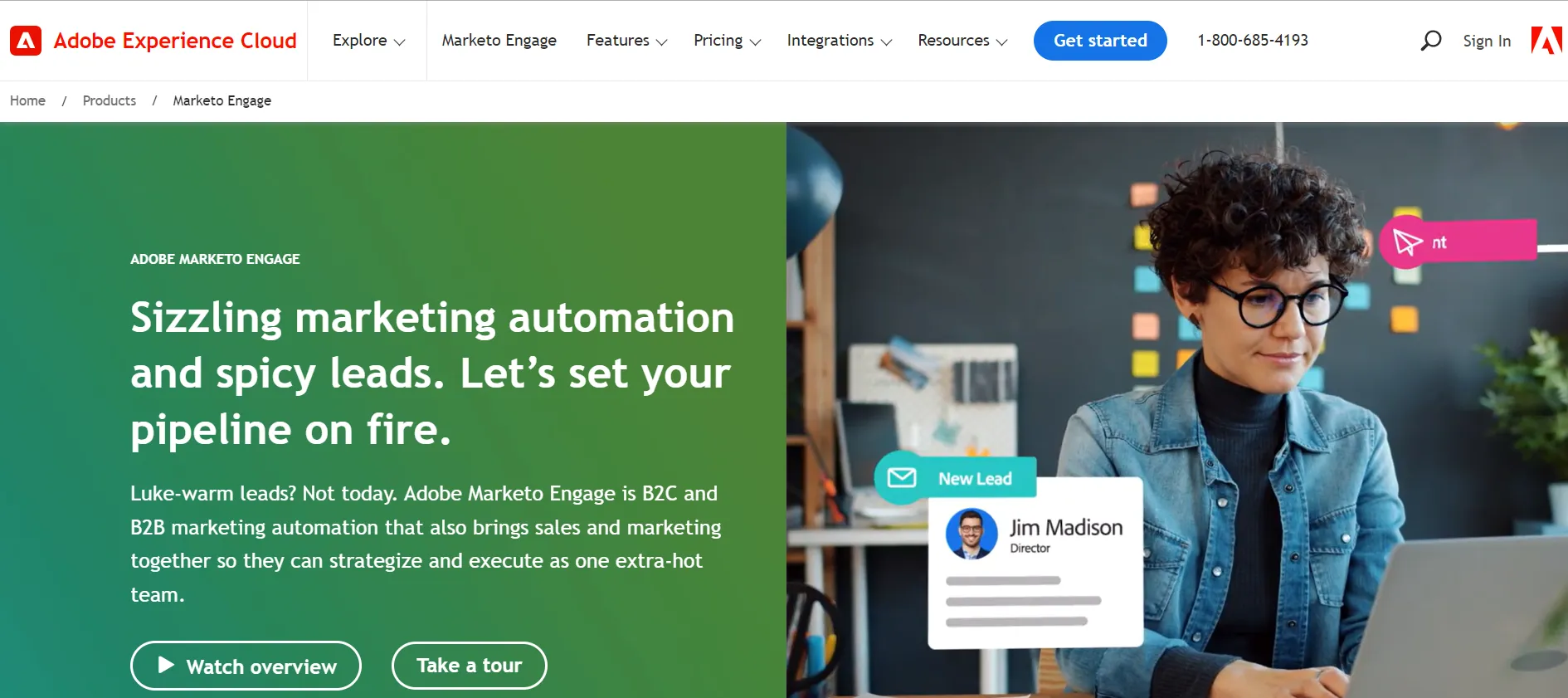
Marketo also provides AI-powered predictive content to serve hyper-targeted assets. It leverages AI to analyze customer data and behaviors to predict which content assets will be most relevant to each individual.
This allows Marketo to automatically deliver personalized, hyper-targeted content to customers that is more likely to drive engagement.
Overall, this software has the marketing automation to feed your sales funnel and accelerate deals.
Key Features of Marketo Engage:
Lead Nurturing You can create automated email campaigns to engage and nurture leads over time. Lead Scoring You can define criteria to score leads based on engagement and profile data. Segmentation You can divide your contacts into segments to send more targeted, relevant messaging. Landing Pages You can quickly build customized landing pages for campaigns, ads, events, etc. Web Tracking You can see visitor engagement on your website to identify hot leads. A/B Testing You can A/B test different versions of emails and landing pages to improve performance.Pros and Cons of Marketo Engage:
Pros:
Allows you to send targeted, personalized messages with robust segmentation.Intuitive drag-and-drop canvas to create multi-channel campaigns.Provides detailed analytics and attribution reporting.Identify sales-ready leads with their lead management and scoring features.Can help improve marketing ROI and alignment with sales teams.Cons:
More complex features may require professional services.Can be expensive, with extra fees for more contacts and functionality.Reporting and analytics features may be overwhelming.Not ideal for companies with very small marketing and sales teams.Marketo Engage Pricing:
Growth Request for a custom quote.Select Request for a custom quote.Prime Request for a custom quote.Ultimate Request for a custom quote.Customer Ratings:
G2 4.1 /5 based on 2,400+ reviewsCapterra 4.3
/5 based on 2,400+ reviewsCapterra 4.3 /5 based on 668 reviews
/5 based on 668 reviews
6. Salesforce Sales Cloud
For hardcore sales teams, Salesforce Sales Cloud delivers robust CRM and automation software. This industry-leading sales platform helps you manage the entire sales process in one place.
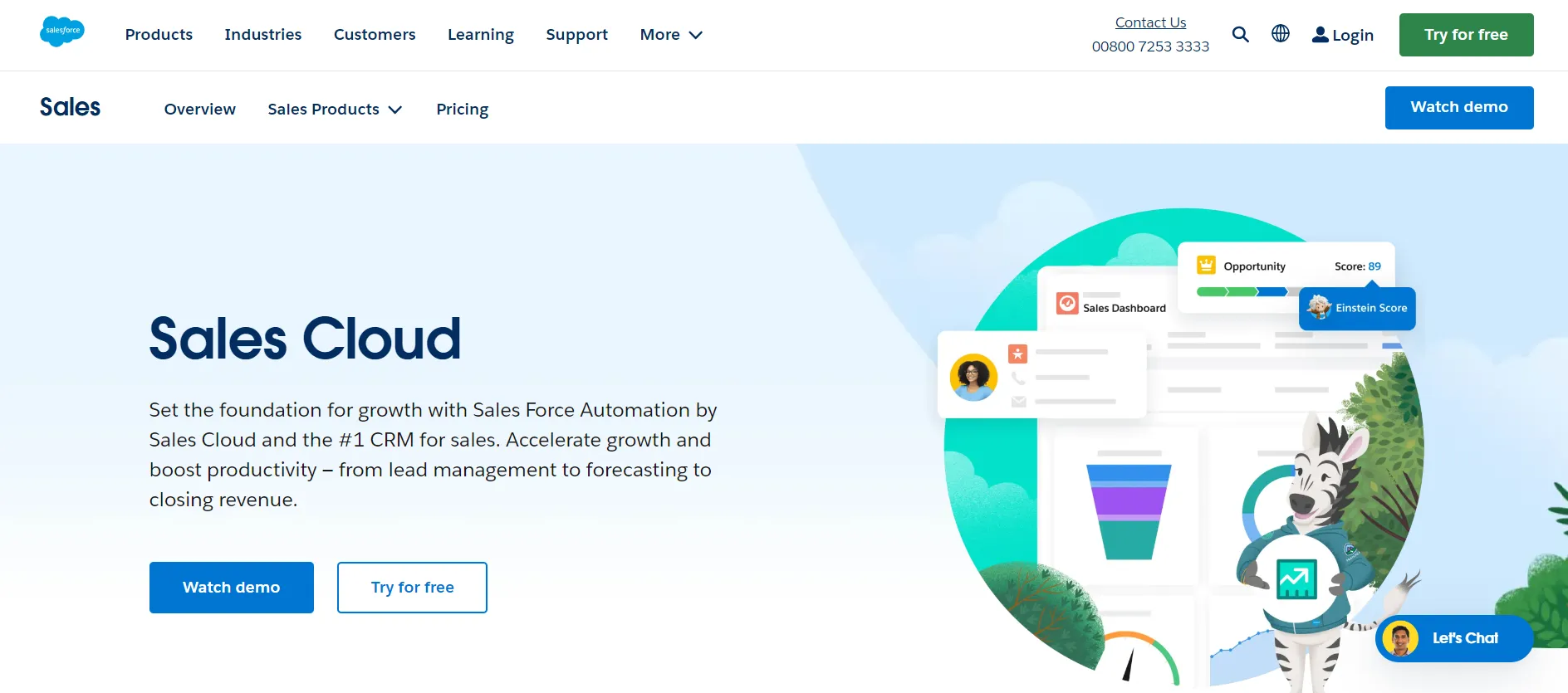
The software comes with advanced features including contact management, opportunity tracking, lead routing, and sales forecasting. You also get access to AI capabilities for predictions and insights.
With Sales Cloud powering your sales, you can scale your sales processes and close deals faster.
Key Features of Salesforce Sales Cloud:
Contact Management You can store all your prospect and customer contact details and history in one centralized location. Workflow Automation You can set up workflows to update records, send tasks, and notify users when deals reach specific stages. Opportunity Tracking You can track your potential sales deals as opportunities and monitor their progress. Sales Forecasting You can use opportunity data to forecast expected sales revenue. Lead Management You can capture new leads and track their activities to become customers. Reporting & Dashboards You have access to reports and dashboards providing sales metrics and pipeline visibility.Pros and Cons of Salesforce Sales Cloud:
Pros:
Very customizable and flexible to meet sales team needs.Robust mobile capabilities allow salespeople to work anywhere.Salesforce AppExchange has thousands of integrations and add-ons.Detailed visibility into all customer interactions and data.Built-in sales analytics, forecasting, and reporting.Easy to create quotes, proposals, and contracts within the platform.Cons:
Can be costly for smaller businesses.Customizations and add-ons increase complexity over time.Cluttered interface if not optimized for roles.Reporting takes time and expertise to optimize.Salesforce Sales Cloud Pricing:
Starter 25/user per monthProfessional 80/user per monthEnterprise 165/user per monthUnlimited 330/user per monthCustomer Ratings:
G2 4.3 /5 based on 18,200+ reviewsCapterra 4.4
/5 based on 18,200+ reviewsCapterra 4.4 /5 based on 17,800+ reviews
/5 based on 17,800+ reviews
7. Hubspot Sales Hub
For small to midsize businesses looking for affordable CRM and sales acceleration software, HubSpot Sales Hub is a great choice.
It comes with many useful features including contact management, email tracking, lead scoring, and email automation.
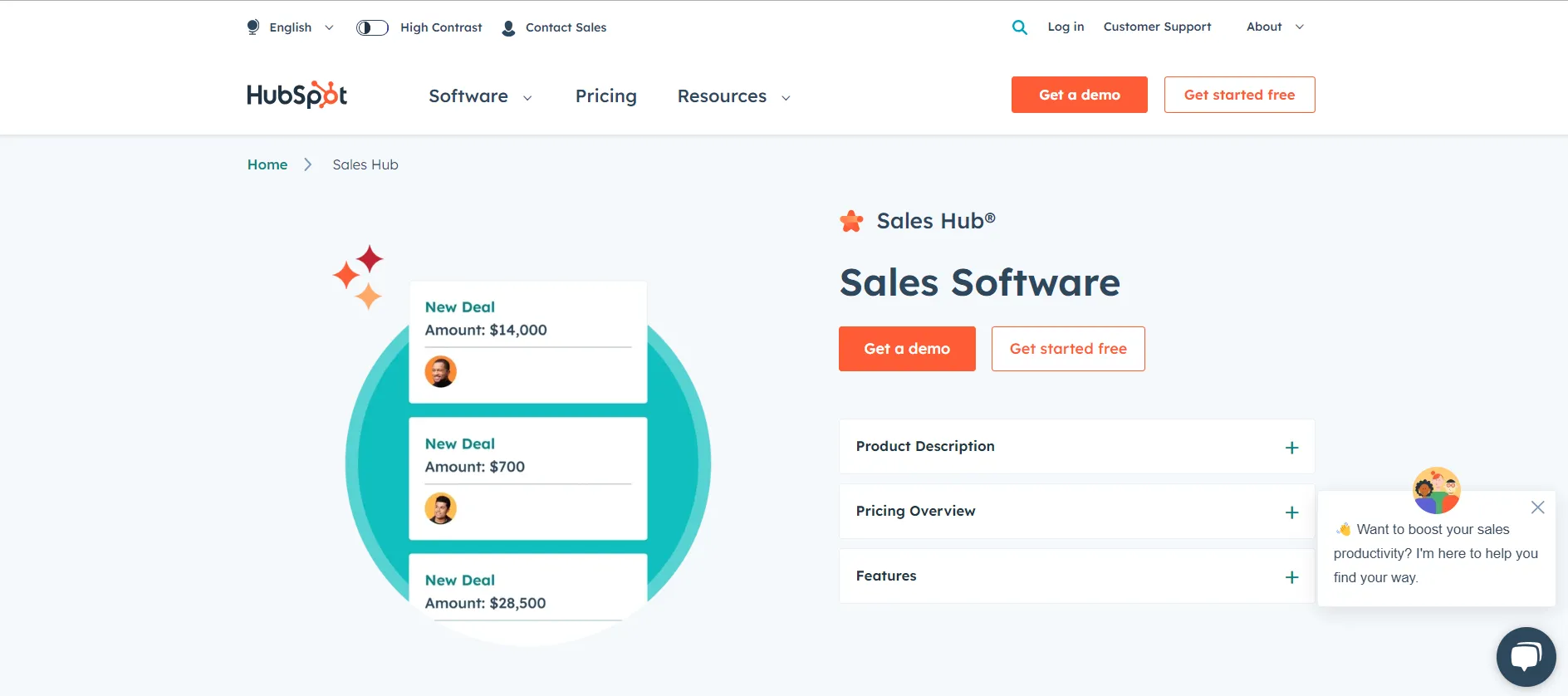
HubSpot also provides a sequence builder to automate and personalize your sales workflows. And with conversation intelligence tools, you can analyze your emails and calls to optimize your approach.
Overall, HubSpot Sales Hub brings robust sales acceleration tools to growing businesses.
Key Features of HubSpot Sales Hub:
Contact Management You can store all contacts, deals, and companies in one centralized CRM. Email Sequences You can set up automated email workflows to nurture prospects. Email Tracking You can see who opens and clicks your emails to monitor engagement. Email Templates You have access to pre-written email templates to save time on writing emails. Meeting Scheduling You can use one-click meeting scheduling right from emails. Deal Stages You can progress deals through custom stages defined in your sales process. Sales Pipelines You have visibility into deal status, value, and activities through the sales pipeline. Reporting & Dashboards You have access to reports on sales performance and pipeline.Pros and Cons of HubSpot Sales Hub:
Pros:
Has a free CRM version with basic features.Very intuitive and easy-to-use interface.Built-in tools for email tracking, workflows, and reporting.Contact insights from website visits and engagement.Email templates and sequencing for outreach campaigns.Meetings and call logging to capture interactions.Cons:
Contacts are limited to one-to-one relationships (no accounts model).Email automation lacks some advanced features.Not ideal for complex sales processes.HubSpot Sales Hub Pricing:
Free $0 per monthStarter $20 per monthProfessional $450 per monthEnterprise $1,200 per monthCustomer Ratings:
G2 4.4 /5 based on 10,700+ reviewsCapterra 4.5
/5 based on 10,700+ reviewsCapterra 4.5 /5 based on 432 reviews
/5 based on 432 reviews
8. Uniqode (Previously Beaconstac)
Uniqode helps transform those tiny squares into sales acceleration machines. Trusted by giants like The New York Times, Deloitte, and Amazon, Uniqode (formerly Beaconstac) is an enterprise-grade QR Code generator solution.

What sets Uniqode apart is its unique feature that allows you to tailor every aspect of your QR Codes to align with your brands identity. You can seamlessly create custom QR Codes and share product info, promotions, or exclusive deals, boosting customer engagement. With robust analytics, track QR Code performance and fine-tune strategies, ensuring a swift and effective sales acceleration journey for your business.
Key Features of Uniqode:
Easy to Use: Uniqodes user-friendly interface and well-organized dashboard simplify QR Code creation and customization, making it a breeze. Reliable Scanning: Ensure functional QR Codes with Uniqodes real-time scannability score, minimizing the risk of non-functional codes. Effective Analytics: Measure engagement through Google Analytics integration and 4000+ other integrations with sales and marketing stack, analyzing QR Code campaign performance in real-world scenarios. Global Reach: Manage and personalize global QR Code campaigns effortlessly with Uniqode, tailoring strategies for different regions and demographics. Enterprise Features: Access advanced features like retargeting, enterprise SSO, white label, and more, catering specifically to enterprise needs. Seamless Integration: Connect Uniqode with your CRMs, HR tools, and sales stacks with over 4000 integrations for a streamlined workflow. Top-notch Security: Malware & phishing URL detection, SSO integration via SAML, and 2-factor authentication (2FA) ensure protection against scan inconsistencies and phishing URLs and uphold data integrity, complying with SOC-2 Type II and GDPR standards for robust security. 24/7 Support: Count on round-the-clock customer support from Uniqode, ensuring assistance whenever you need it. Boost sales acceleration effortlessly with these features in your toolkit.Pros and Cons of Yesware:
Pros:
User-friendly dashboard for easy QR Code customization.You can create over ten different types of QR Codes.A free forever plan along with a trial plan to try out all of Uniqodes exclusive features. Real-time scannability score ensures functional QR Codes.Advanced options like retargeting and white label for tailored solutions.Cons:
The free version doesnt include all the QR Code types.Advanced customizations and QR Code analytics are only available with the premium QR Codes.Uniqode Pricing:
Starter $5/month.Lite $16/month.Pro $49/month.Plus $99/month.Business+ Custom pricing.Customer Ratings:
G2 4.9 /5 based on 392 reviewsCapterra 4
/5 based on 392 reviewsCapterra 4 /5
/5
9. Pipedrive
Pipedrive is another great option, especially for small sales teams. This CRM platform focuses specifically on visual sales pipeline management.
You can create customizable pipelines and move deals through distinct stages. Pipedrive also offers built-in reporting and notifications to stay on top of your pipeline.

If you need an affordable, dedicated sales solution to optimize your workflow, check out Pipedrive.
Key Features of Pipedrive:
Deal Pipeline You can visualize your sales pipeline by categorizing deals into different stages. Deal Forecasting You can forecast expected revenue based on your open deals and pipeline stages. Email Integration You can track emails from your inbox and log them to deal and contact records. Lead Management You can capture new leads and track their activities to become customers. Activity Logging Pipedrive automatically logs emails, calls, meetings, and notes with leads and deals. Reporting You have access to reports and insights on deal values, pipelines, activities, and source effectiveness. Calendaring You can schedule meetings and log call activities right in Pipedrive. Team Collaboration You can assign deals to teammates, mention them, and view deal ownership.Pros and Cons of Pipedrive:
Pros:
Very user-friendly interface and is easy to get started.Affordable pricing plans for small businesses.The activity-based interface focuses on key sales actions.Customizable sales pipelines and deal stages.Integrates with many apps via Zapier and workflows.Calendar syncing with Google and Outlook.Customizable user roles and permissions.Cons:
Lacks email automation.Limited customization and personalization options.Lacks detailed sales insights/forecasting features.Pipedrive Pricing:
Essential $9.90/user per month (when billed annually)Advanced $19.90/user per month (when billed annually)Professional $39.90/user per month (when billed annually)Power $49.90/user per month (when billed annually)Enterprise $59.90/user per month (when billed annually)Customer Ratings:
G2 4.2 /5 based on 1,600+ reviewsCapterra 4.5
/5 based on 1,600+ reviewsCapterra 4.5 /5 based on 2,800+ reviews
/5 based on 2,800+ reviews
10. EngageBay
If you want an all-in-one sales and marketing platform, you should check out EngageBay.
This all-in-one tool provides CRM, email marketing, landing pages, and more. You can monitor prospect interactions across channels to identify hot leads.

EngageBay also makes it easy to segment contacts and automate personalized campaigns. With robust analytics, you can continuously fine-tune your sales and marketing process.
Key Features of EngageBay:
Contact Management You can store all your contacts and client information in one centralized CRM. Lead Tracking You can capture leads from forms, calls, and emails and track their journey. Sales Pipeline You can check your sales funnel clearly, with deals categorized into different stages. Email Marketing You can create, send, and track email campaigns and newsletters. Landing Pages You can make customized landing pages for campaigns, promotions, and events. Email Tracking You can see email open rates, link clicks, and subscriber engagement. Appointment Scheduling You and your clients can schedule meetings and appointments. Workflow Automation You can set up triggers and actions so CRM tasks happen automatically.Pros and Cons of EngageBay:
Pros:
Affordable pricing plans for small businesses.Easy to create and customize sales funnels.Drag and drop form builder for landing pages.Provides quotes and invoicing capabilities.Built-in email marketing and automation.Contact management with lead scoring.Cons:
Reporting and analytics lack more complex features.Potential email deliverability issues.Sales insight capabilities are less advanced than competitors.EngageBay Pricing:
Free $0/user per month (when billed annually)Basic $13.79/user per month (when billed annually)Growth $45.99/user per month (when billed annually)Pro $91.99/user per month (when billed annually)Customer Ratings:
G2 4.6 /5 based on 211 reviewsCapterra 4.7
/5 based on 211 reviewsCapterra 4.7 /5 based on 570 reviews
/5 based on 570 reviews
11. LeadSquared
LeadSquared should be high on your list for robust sales acceleration. This platform offers a wide range of features to capture more leads and nurture them effectively.
Using this software, you can create effective lead capture forms to collect contacts from your website and campaigns.
It automatically scores your leads to show you who the hottest prospects are that you should focus on first. You can then create tailored, automated campaigns to nurture these top leads.
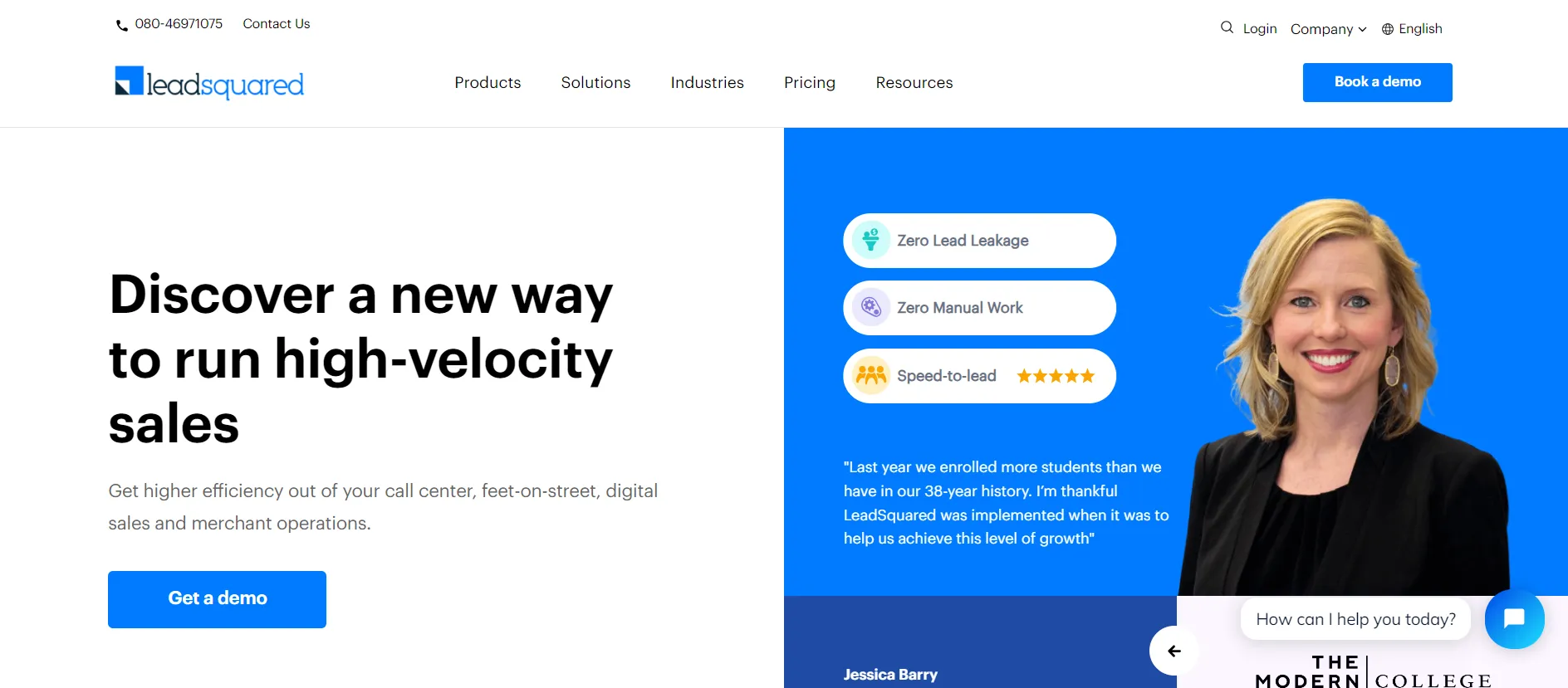
LeadSquared lets you send super-targeted messages to turn leads into buyers. It also allows you to call and text leads across channels for better outreach.
Key Features of LeadSquared:
Lead Capture You can capture leads from your website, landing pages, calls, emails, etc. Lead Scoring You can define criteria to automatically score leads based on profile and activities. Lead Routing You can auto-assign leads to sales reps based on territory. Lead Nurturing You can set up automated email and SMS sequences to nurture leads. Sales Tracking You can manage the entire sales process from lead to closed deal within LeadSquared. Sales Reports You have access to reports on deals, pipelines, lead sources, rep performance, etc. Smart Calendar The calendar shows scheduled meetings, calls, and pending follow-ups in one view.Pros and Cons of LeadSquared:
Pros:
Easy to create targeted email and SMS campaigns.Automate sales workflows triggered by actions.Customizable sales dashboards and reports.Flexible segmentation for outreach campaigns.Libraries of templates and playbooks to leverage.Affordable pricing plans for small businesses.Cons:
User interface can be improved.Email automation lacks more advanced features.Lead scoring functionality is basic.LeadSquared Pricing:
Lite $15/user per month (when billed annually)Pro $50/user per month (when billed annually)Super $100/user per month (when billed annually)Ultimate Request for a custom quoteCustomer Ratings:
G2 4.6 /5 based on 208 reviewsCapterra 4.3
/5 based on 208 reviewsCapterra 4.3 /5 based on 155 reviews
/5 based on 155 reviews
12. Zendesk Sell
Zendesk Sell gives you a complete sales platform to optimize your workflow.
It lets you organize your contacts and see your pipeline health in one place. You can set up automated sales tasks and sequences to be more efficient.

With Zendesk Sell, you can track what your prospects are doing across channels like email and social media. This way, you can send them more targeted follow-up emails.
It also has a library of cold email templates, call integration, and voicemail drop to scale your outreach. This can help you speed up your deal cycles.
Key Features of Zendesk Sell:
Lead Tracking You can capture and track leads from multiple sources like forms, emails, chats, etc. Lead Routing You can define rules to automatically assign leads to the right sales reps. Sales Workflow You can customize deal stages and sales processes specific to your team. Email Integration You can sync email conversations to relevant contact and deal records. Sales Reporting You have visibility into deals, pipelines, activities, and team member performance. Sales Forecasting You can use pipeline data to forecast expected revenue. Task Management You can create and assign follow-up tasks to yourself or teammates.Pros and Cons of Zendesk Sell:
Pros:
Easy to create and track sales activities.Email automation for sequences and reminders.Customizable sales pipelines and deal stages.Real-time notifications on deal updates.Clean, straightforward interface.Cons:
Lacks details in sales forecasting and predictive insights.Less flexibility in segmentation and personalization.Email automation lacks more advanced features.Zendesk Sell Pricing:
Sell Team $19/agent per month (when billed annually)Sell Growth $55/agent per month (when billed annually)Sell Professional $115/agent per month (when billed annually)Customer Ratings:
G2 4.2 /5 based on 478 reviewsCapterra 4.3
/5 based on 478 reviewsCapterra 4.3 /5 based on 151 reviews
/5 based on 151 reviews
13. Groove
Groove is a sales CRM that is very affordable for startups and small teams. It has some key features that can help you speed up your sales, even as a small business.
Groove lets you organize all your important contact details so they are easy to access. It also scores your leads for you automatically, so you instantly know who your hottest prospects are.

The sales pipeline feature gives you an overview of where all your deals are at. This helps you focus on pushing deals to close.
Groove integrates smoothly with other tools you already use daily, like Gmail for managing emails. It also works with Calendly which makes it easy to schedule meetings with prospects.
Overall, Groove is a great option to consider if you want to speed up your sales process this year but dont have a big budget.
Key Features of Groove:
Lead Management You can capture leads from forms, emails, chats, and calls and track their journey. Deal Stages You can customize deal stages and move deals through your sales process. Sales Pipeline You have visibility into deal values, statuses, and activities in your pipeline. Sales Reports You have access to reports on deal performance, lead sources, rep activities, and more. Calendar You can schedule meetings, log call details, and view your calendar in the CRM. Forecasting You can use your pipeline data to forecast expected revenue. Team Collaboration You can assign deals to teammates and collaborate on accounts.Pros and Cons of Groove:
Pros:
Simple and intuitive interface.Affordable pricing tiers for small/medium businesses.Sequence builder automates email and call follow-ups.Team inbox allows collaborating on leads.Lead and account-level tracking and history.Customizable sales workflows.Cons:
Reporting capabilities are relatively basic.Call capabilities are reliant on partner integrations.Email automation is less advanced than competitors.Groove Pricing:
Always Free $0/user per month (3 users | 2 channels)Standard $12/user per month (5 users | 5 channels | billed annually)Premium $20/user per month (15 users | 10 channels | billed annually)Advanced $40/user per month (50 users | unlimited channels | billed annually)Customer Ratings:
G2 4.7 /5 based on 2,800+ reviewsCapterra 4.5
/5 based on 2,800+ reviewsCapterra 4.5 /5 based on 66 reviews
/5 based on 66 reviews
14. Zoho CRM
Zoho CRM is a great all-around CRM for sales acceleration. It lets you manage your pipeline and view key reports to keep sales on track.
Zoho CRM makes it simple to capture leads from your website, events, etc. By integrating Zoho CRM with your website and events, you cant lead information through forms, registrations, and other interactions.
You can then score them to prioritize follow-ups with your hottest prospects first. It also allows you to set up automation rules to nurture leads based on their activity and engagement.

For sales outreach, Zoho CRM provides email templates, mass email, and SMS capabilities so you can scale communications easily. It also integrates with business phone systems for call logging and tracking.
With its end-to-end sales acceleration features, Zoho CRM is a great option to consider. It can help streamline your processes and boost productivity.
Key Features of Zoho CRM:
Lead Capture You can capture leads from your website, trade shows, referrals, etc. Sales Tracking You can manage deals from lead to close and visualize your sales pipeline. Sales Forecasting You can use pipeline data to forecast expected revenue. Territory Management You can define sales regions and assign them to reps. Reporting & Dashboards You can have visibility into sales performance, pipelines, activities, and more through reports. Customization You can tailor Zoho CRM by adding custom fields, views, and deal stages.Pros and Cons of Zoho CRM:
Pros:
Affordable pricing tiers, including a free version.User-friendly interface.Customizable sales pipelines and deal stages.Built-in email marketing and automation.Integrates with Google Workspace productivity apps.Scales to support larger sales teams.Cons:
Occasional email deliverability issues.Customization options are not as robust as top-tier CRMs.Lacks some newer CRM features like predictive forecasting.Zoho CRM Pricing:
Free $0/user per monthStandard $14/user per month (when billed annually)Professional $23/user per month (when billed annually)Enterprise $40/user per month (when billed annually)Customer Ratings:
G2 4.0 /5 based on 2,400+ reviewsCapterra 4.3
/5 based on 2,400+ reviewsCapterra 4.3 /5 based on 6,400+ reviews
/5 based on 6,400+ reviews
15. Freshworks CRM
Freshworks CRM is another solid pick, especially for small business sales teams. It has features that help you focus on your hottest prospects and close deals faster.

With Freshworks CRM, you can keep all your important contact details in one spot. You can also see all your open deals together and where they are at.
It automatically scores your leads for you based on activities like email opens. This helps you instantly know who your warmest prospects are to follow up with first.
You can see prospect interactions across channels like email and calls. This gives you a complete view of who to focus your time on.
Key Features of Freshworks CRM:
Contact Management You can store all your prospect and customer information in one centralized CRM. Lead Management You can capture and nurture leads until they convert into customers. Deals & Pipeline You can track your sales deals through customized pipeline stages. Calendar You can access your shared team calendar to schedule meetings and log call details. Integrations Freshworks CRM integrates seamlessly with other sales and marketing tools you use.Pros and Cons of Freshworks CRM:
Pros:
Automated lead scoring and routing.Customizable sales reports and dashboards.Contact management with deal tracking.Third-party integrations via APIs.Flexible workflow automation.Cons:
Less advanced sales forecasting insights.Less flexibility in sales process customization.Slow support response times.Freshworks CRM Pricing:
Growth $15 per monthPro $39 per monthEnterprise $69 per monthCustomer Ratings:
G2 4.5 /5 based on 1,000+ reviewsCapterra 4.5
/5 based on 1,000+ reviewsCapterra 4.5 /5 based on 599 reviews
/5 based on 599 reviews
Ready to Accelerate Your Sales Process?
As yo






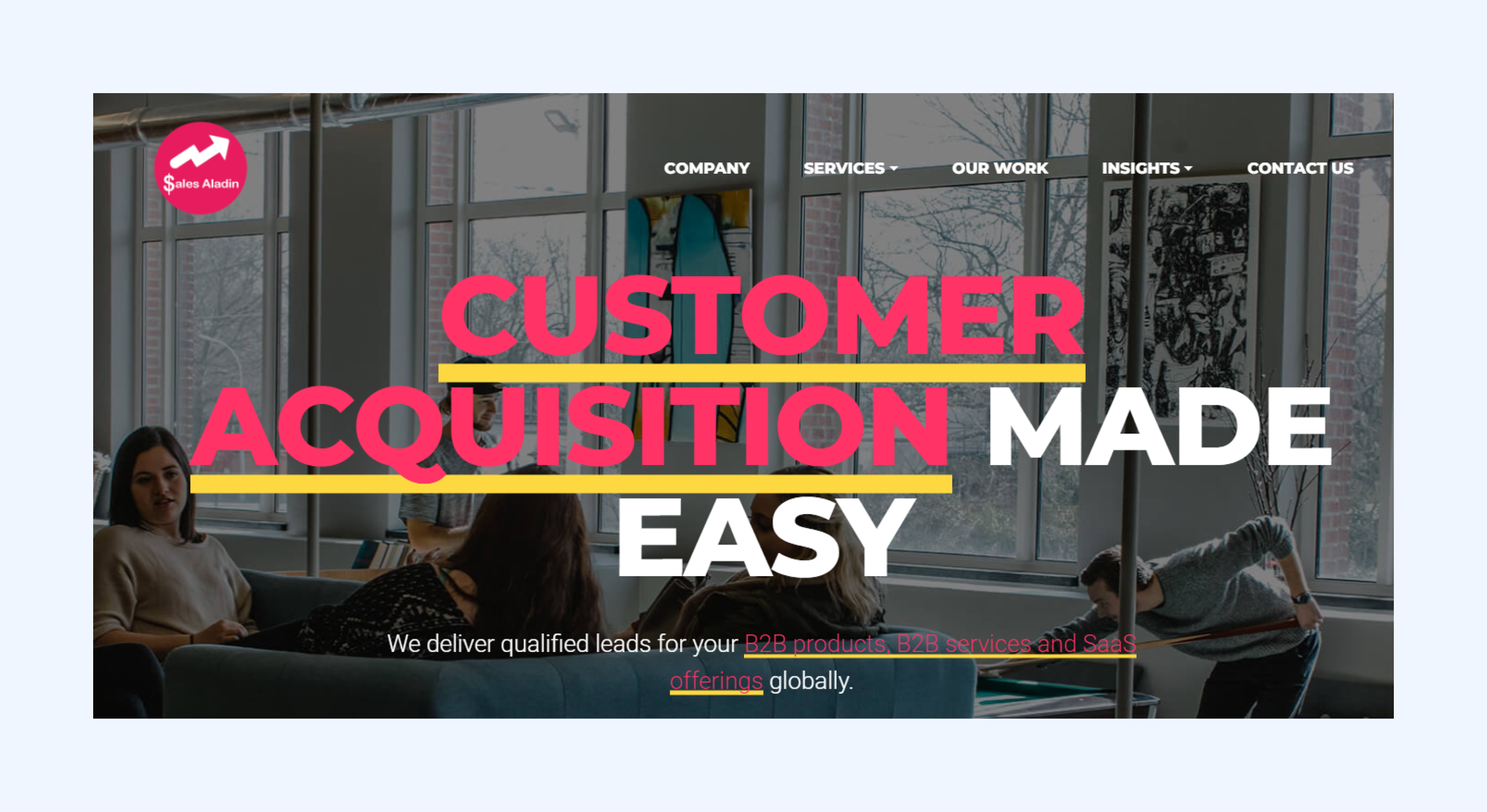
![10 Best GMass Alternatives 2024 [Revised List!]](https://www.saleshandy.com/blog/wp-content/uploads/2022/08/Saleshandy-homepage.webp)



